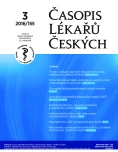-
Medical journals
- Career
Trends in indication of selected laboratory methods by general practitioners
Authors: doc. MUDr. Ph.D. Bohumil Seifert; MUDr. Jana Vojtíšková; Ing Zdeněk Vitásek
Authors‘ workplace: Ústav všeobecného lékařství 1. LF UK v Praze 1; Zaměstnanecká pojišťovna Škoda: Mladá Boleslav 2
Published in: Čas. Lék. čes. 2016; 155: 116-120
Category: Original Article
Overview
The indication of laboratory methods in general practice is significantly influenced by practical guidelines and protocols for preventive care. The financial regulation pushes on rationalisation of the use of laboratory methods. Point of care testing is more and more important in prevention, diagnostics and follow up in primary care settings.
Based on the data available from Škoda Insurance Company authors aimed to describe trends in induction and cost of laboratory methods, the most frequent methods used in primary care and trends in the use of POCT methods within general practice.
The expenditures for laboratory methods in general practice are stable for a long term and suggest a rational behaviour of general practitioners. The most frequently indicated methods in general practice are glycaemia, ALT and AST. From expensive methods the most frequent are PSA, troponin and tumormarkers. The number of general practices performing POCT methods and also the number of POCT examinations increase. More than one half of INR examinations and nearly half of all CRP examinations are performed in POCT regime.Key words:
laboratory methods, clinical biochemistry, general practitioner, primary care, POCT
Sources
1. Zima T a kol. Laboratorní diagnostika (3. vydání). Galén, Praha, 2013.
2. Zima T, Springer D, Seifert B a kol. Laboratorní metody, část 1. Biochemické metody. Doporučený diagnostický a léčebný postup pro všeobecné praktické lékaře. SVL ČLS JEP, 2008, www.svl.cz
3. Bruthans J. Duplicitní předoperační laboratorní vyšetření a možnost úspor pomocí systému eHealth. nf.vse.cz/files/useruploads/ws_bruthans.pdf
4. Junker R, Schlebusch H, Luppa PB. Point-of-care testing in hospitals and primary care. Dtsch Arztebl Int 2010; 107(33): 561−567.
5. Vojtíšková J. Racionální indikace laboratorních metod. Lékařské listy 2009; 13 : 15−21.
6. Karen I, Filipovský J. Arteriální hypertenze. Doporučený diagnostický a léčebný postup pro všeobecné praktické lékaře. SVL ČLS JEP, 2014, www.svl.cz
7. Brát J, Češka R, Herber O. Dyslipidemie. Doporučený diagnostický a léčebný postup pro všeobecné praktické lékaře. SVL ČLS JEP, 2012, www.svl.cz
8. Býma S, Hradec J. Prevence kardiovaskulárních onemocnění. Doporučený diagnostický a léčebný postup pro všeobecné praktické lékaře. SVL ČLS JEP, 2013, www.svl.cz
9. Karen I, Svačina I, Škrha J. Diabetes mellitus. Doporučený diagnostický a léčebný postup pro všeobecné praktické lékaře. SVL ČLS JEP, 2013, www.svl.cz
Labels
Addictology Allergology and clinical immunology Angiology Audiology Clinical biochemistry Dermatology & STDs Paediatric gastroenterology Paediatric surgery Paediatric cardiology Paediatric neurology Paediatric ENT Paediatric psychiatry Paediatric rheumatology Diabetology Pharmacy Vascular surgery Pain management Dental Hygienist
Article was published inJournal of Czech Physicians

-
All articles in this issue
- Trends in indication of selected laboratory methods by general practitioners
- Potential sources of phthalates and bisphenol A and their significance in the development of metabolic diseases
- To the anniversary of prof. Jana Parizkova, MD, DSc.
- Surgical treatment of lower extremity peripheral nerve injuries
- Outpatient parenteral antibiotic therapy (OPAT)
- Faecal incontinence – serious medical and social issue
- Vesicoureteric reflux in children: many questions still unanswered
- Hyponatremia in children: from pathophysiology to therapy
- Role of incretins in energy metabolism and weight changes after smoking cessation
- Biobanks − European infrastructure
- Surgeons and Neurosurgeons as Nobel Prize Winners
- Journal of Czech Physicians
- Journal archive
- Current issue
- Online only
- About the journal
Most read in this issue- Vesicoureteric reflux in children: many questions still unanswered
- Surgical treatment of lower extremity peripheral nerve injuries
- Hyponatremia in children: from pathophysiology to therapy
- Faecal incontinence – serious medical and social issue
Login#ADS_BOTTOM_SCRIPTS#Forgotten passwordEnter the email address that you registered with. We will send you instructions on how to set a new password.
- Career

